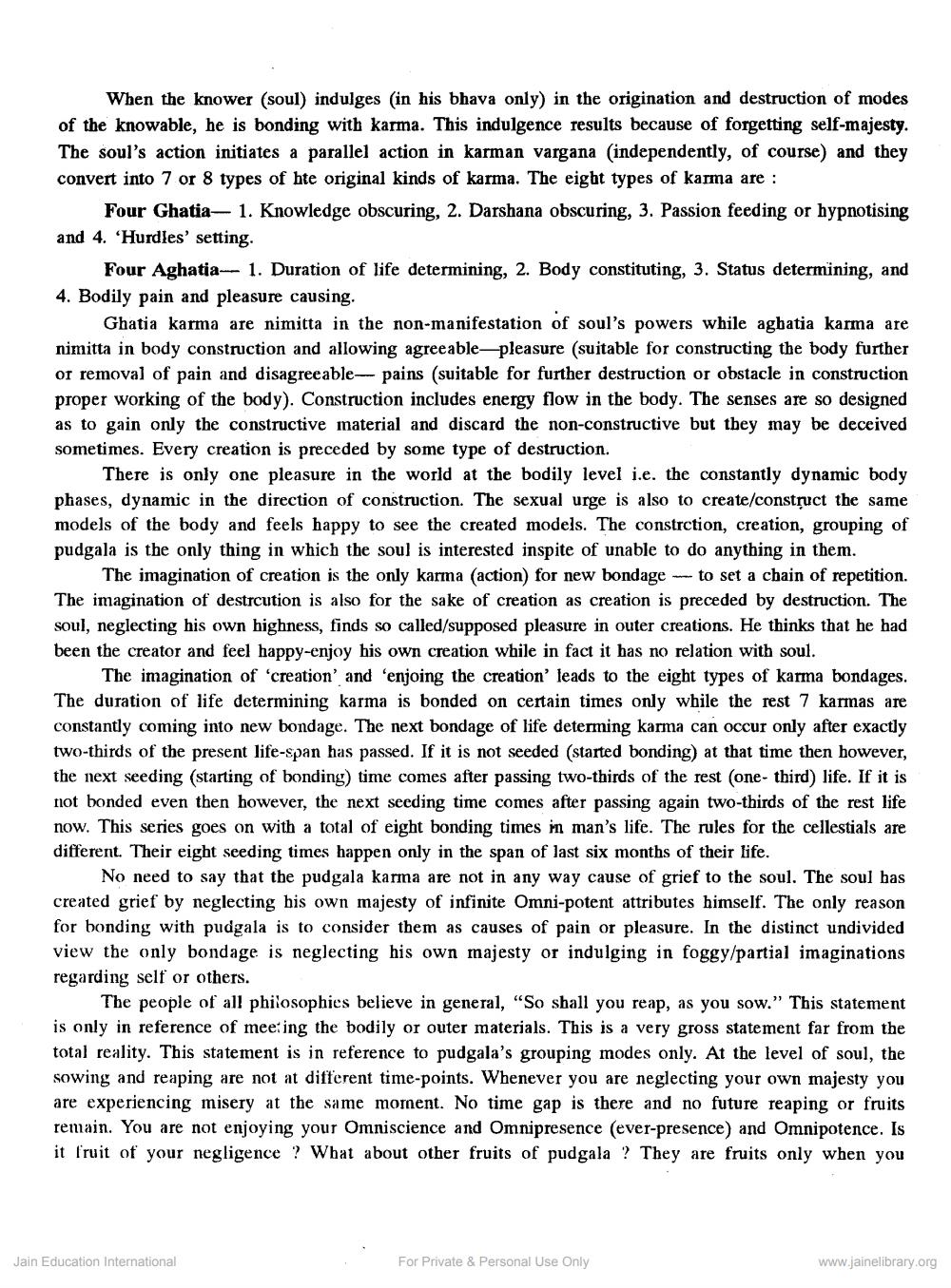________________
When the knower (soul) indulges (in his bhava only) in the origination and destruction of modes of the knowable, he is bonding with karma. This indulgence results because of forgetting self-majesty. The soul's action initiates a parallel action in karman vargana (independently, of course) and they convert into 7 or 8 types of hte original kinds of karma. The eight types of karma are :
Four Ghatia— 1. Knowledge obscuring, 2. Darshana obscuring, 3. Passion feeding or hypnotising and 4. 'Hurdles' setting.
Four Aghatia-- 1. Duration of life determining, 2. Body constituting, 3. Status determining, and 4. Bodily pain and pleasure causing.
Ghatia karma are nimitta in the non-manifestation of soul's powers while agbatia karma are nimitta in body construction and allowing agreeable-pleasure (suitable for constructing the body further or removal of pain and disagreeable-- pains (suitable for further destruction or obstacle in construction proper working of the body). Construction includes energy flow in the body. The senses are so designed as to gain only the constructive material and discard the non-constructive but they may be deceived sometimes. Every creation is preceded by some type of destruction.
There is only one pleasure in the world at the bodily level i.e. the constantly dynamic body phases, dynamic in the direction of construction. The sexual urge is also to create/construct the same models of the body and feels happy to see the created models. The constrction, creation, grouping of pudgala is the only thing in which the soul is interested inspite of unable to do anything in them.
The imagination of creation is the only karma (action) for new bondage - to set a chain of repetition. The imagination of destrcution is also for the sake of creation as creation is preceded by destruction. The soul, neglecting his own highness, finds so called/supposed pleasure in outer creations. He thinks that he had been the creator and feel happy-enjoy his own creation while in fact it has no relation with soul.
The imagination of 'creation' and 'enjoing the creation' leads to the eight types of karma bondages. The duration of life determining karma is bonded on certain times only while the rest 7 karmas are constantly coming into new bondage. The next bondage of life determing karma can occur only after exactly two-thirds of the present life-span has passed. If it is not seeded (started bonding) at that time then however, the next seeding (starting of bonding) time comes after passing two-thirds of the rest (one-third) life. If it is not bonded even then however, the next seeding time comes after passing again two-thirds of the rest life now. This series goes on with a total of eight bonding times in man's life. The rules for the cellestials are different. Their eight seeding times happen only in the span of last six months of their life.
No need to say that the pudgala karma are not in any way cause of grief to the soul. The soul has created grief by neglecting his own majesty of infinite Omni-potent attributes himself. The only reason for bonding with pudgala is to consider them as causes of pain or pleasure. In the distinct undivided view the only bondage is neglecting his own majesty or indulging in foggy/partial imaginations regarding self or others.
The people of all philosophies believe in general, “So shall you reap, as you sow.” This statement is only in reference of meeting the bodily or outer materials. This is a very gross statement far from the total reality. This statement is in reference to pudgala's grouping modes only. At the level of soul, the sowing and reaping are not at different time-points. Whenever you are neglecting your own majesty you are experiencing misery at the same moment. No time gap is there and no future reaping or fruits remain. You are not enjoying your Omniscience and Omnipresence (ever-presence) and Omnipotence. Is it fruit of your negligence ? What about other fruits of pudgala ? They are fruits only when you
Jain Education International
For Private & Personal Use Only
www.jainelibrary.org




